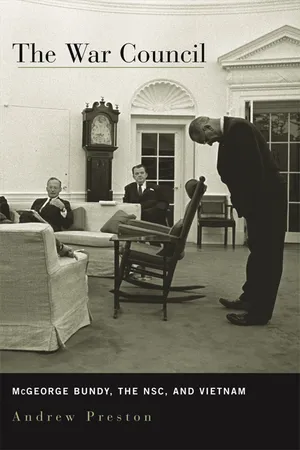
- English
- PDF
- Available on iOS & Android
About this book
Was the Vietnam War unavoidable? Historians have long assumed that ideological views and the momentum of events made American intervention inevitable. By examining the role of McGeorge Bundy and the National Security Council, Andrew Preston demonstrates that policymakers escalated the conflict in Vietnam in the face of internal opposition, external pressures, and a continually failing strategy.
Bundy created the position of National Security Adviser as we know it today, with momentous consequences that continue to shape American foreign policy. Both today's presidential supremacy in foreign policy and the contemporary national security bureaucracy find their origins in Bundy's powers as the first National Security Adviser and in the ways in which he and his staff brought about American intervention in Vietnam. Presidents Kennedy and Johnson were not enthusiastic about waging a difficult war in pursuit of murky aims, but the NSC's bureaucratic dexterity and persuasive influence in the Oval Office skewed the debate in favor of the conflict.
In challenging the prevailing view of Bundy as a loyal but quietly doubting warrior, Preston also revises our understanding of what it meant--and means--to be a hawk or a dove. The War Council is an illuminating and compelling story with two inseparable themes: the acquisition and consolidation of power; and how that power is exercised.
Frequently asked questions
- Essential is ideal for learners and professionals who enjoy exploring a wide range of subjects. Access the Essential Library with 800,000+ trusted titles and best-sellers across business, personal growth, and the humanities. Includes unlimited reading time and Standard Read Aloud voice.
- Complete: Perfect for advanced learners and researchers needing full, unrestricted access. Unlock 1.4M+ books across hundreds of subjects, including academic and specialized titles. The Complete Plan also includes advanced features like Premium Read Aloud and Research Assistant.
Please note we cannot support devices running on iOS 13 and Android 7 or earlier. Learn more about using the app.
Information

Table of contents
- Contents
- Acknowledgments
- Introduction
- 1. The Mentor: Stimson’s Influence on Bundy
- 2. A Foreign Office in Microcosm: Creating the National Security Adviser and Re-creating the NSC Staff
- 3. Learning to Fear the Bomb: Kennedy’s Crises and the Origins of Détente
- 4. The Hawk: Rostow and the First Attempt at Americanization
- 5. The Soft Hawk: Forrestal and Nonmilitary Escalation
- 6. Bundy the Adviser: The Drift to War
- 7. Bundy the Advocate: The Rush to War
- 8. Bundy Ambivalent: Rolling Thunder, Student Unrest, and the Decision to Commit Troops
- 9. Bundy Resilient: The Bombing Pause and the Continuing Search for a Successful Policy
- Epilogue: Legacies
- Notes
- Bibliography of Primary Sources
- Index